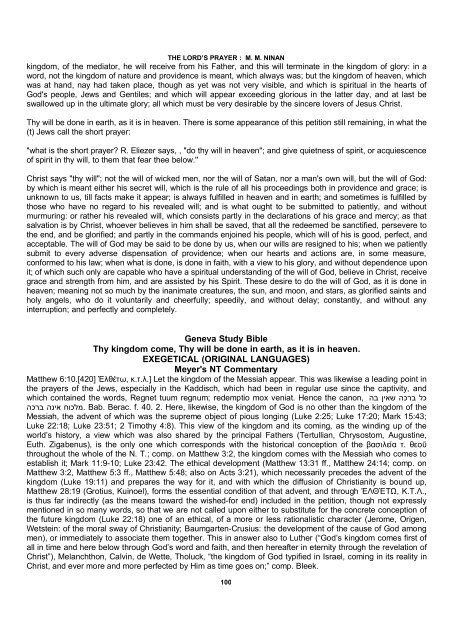Lord's Prayer
Create successful ePaper yourself
Turn your PDF publications into a flip-book with our unique Google optimized e-Paper software.
THE LORD’S PRAYER : M. M. NINAN<br />
kingdom, of the mediator, he will receive from his Father, and this will terminate in the kingdom of glory: in a<br />
word, not the kingdom of nature and providence is meant, which always was; but the kingdom of heaven, which<br />
was at hand, nay had taken place, though as yet was not very visible, and which is spiritual in the hearts of<br />
God's people, Jews and Gentiles; and which will appear exceeding glorious in the latter day, and at last be<br />
swallowed up in the ultimate glory; all which must be very desirable by the sincere lovers of Jesus Christ.<br />
Thy will be done in earth, as it is in heaven. There is some appearance of this petition still remaining, in what the<br />
(t) Jews call the short prayer:<br />
"what is the short prayer? R. Eliezer says, , "do thy will in heaven"; and give quietness of spirit, or acquiescence<br />
of spirit in thy will, to them that fear thee below.''<br />
Christ says "thy will"; not the will of wicked men, nor the will of Satan, nor a man's own will, but the will of God:<br />
by which is meant either his secret will, which is the rule of all his proceedings both in providence and grace; is<br />
unknown to us, till facts make it appear; is always fulfilled in heaven and in earth; and sometimes is fulfilled by<br />
those who have no regard to his revealed will; and is what ought to be submitted to patiently, and without<br />
murmuring: or rather his revealed will, which consists partly in the declarations of his grace and mercy; as that<br />
salvation is by Christ, whoever believes in him shall be saved, that all the redeemed be sanctified, persevere to<br />
the end, and be glorified; and partly in the commands enjoined his people, which will of his is good, perfect, and<br />
acceptable. The will of God may be said to be done by us, when our wills are resigned to his; when we patiently<br />
submit to every adverse dispensation of providence; when our hearts and actions are, in some measure,<br />
conformed to his law; when what is done, is done in faith, with a view to his glory, and without dependence upon<br />
it; of which such only are capable who have a spiritual understanding of the will of God, believe in Christ, receive<br />
grace and strength from him, and are assisted by his Spirit. These desire to do the will of God, as it is done in<br />
heaven; meaning not so much by the inanimate creatures, the sun, and moon, and stars, as glorified saints and<br />
holy angels, who do it voluntarily and cheerfully; speedily, and without delay; constantly, and without any<br />
interruption; and perfectly and completely.<br />
Geneva Study Bible<br />
Thy kingdom come, Thy will be done in earth, as it is in heaven.<br />
EXEGETICAL (ORIGINAL LANGUAGES)<br />
Meyer's NT Commentary<br />
Matthew 6:10.[420] Ἐλθέτω, κ.τ.λ.] Let the kingdom of the Messiah appear. This was likewise a leading point in<br />
the prayers of the Jews, especially in the Kaddisch, which had been in regular use since the captivity, and<br />
כל ברכה שאין בה canon, which contained the words, Regnet tuum regnum; redemptio mox veniat. Hence the<br />
Bab. Berac. f. 40. 2. Here, likewise, the kingdom of God is no other than the kingdom of the .מלכוח אינה ברכה<br />
Messiah, the advent of which was the supreme object of pious longing (Luke 2:25; Luke 17:20; Mark 15:43;<br />
Luke 22:18; Luke 23:51; 2 Timothy 4:8). This view of the kingdom and its coming, as the winding up of the<br />
world’s history, a view which was also shared by the principal Fathers (Tertullian, Chrysostom, Augustine,<br />
Euth. Zigabenus), is the only one which corresponds with the historical conception of the βασιλεία τ. θεοῦ<br />
throughout the whole of the N. T.; comp. on Matthew 3:2, the kingdom comes with the Messiah who comes to<br />
establish it; Mark 11:9-10; Luke 23:42. The ethical development (Matthew 13:31 ff., Matthew 24:14; comp. on<br />
Matthew 3:2, Matthew 5:3 ff., Matthew 5:48; also on Acts 3:21), which necessarily precedes the advent of the<br />
kingdom (Luke 19:11) and prepares the way for it, and with which the diffusion of Christianity is bound up,<br />
Matthew 28:19 (Grotius, Kuinoel), forms the essential condition of that advent, and through ἘΛΘΈΤΩ, Κ.Τ.Λ.,<br />
is thus far indirectly (as the means toward the wished-for end) included in the petition, though not expressly<br />
mentioned in so many words, so that we are not called upon either to substitute for the concrete conception of<br />
the future kingdom (Luke 22:18) one of an ethical, of a more or less rationalistic character (Jerome, Origen,<br />
Wetstein: of the moral sway of Christianity; Baumgarten-Crusius: the development of the cause of God among<br />
men), or immediately to associate them together. This in answer also to Luther (“God’s kingdom comes first of<br />
all in time and here below through God’s word and faith, and then hereafter in eternity through the revelation of<br />
Christ”), Melanchthon, Calvin, de Wette, Tholuck, “the kingdom of God typified in Israel, coming in its reality in<br />
Christ, and ever more and more perfected by Him as time goes on;” comp. Bleek.<br />
100


















